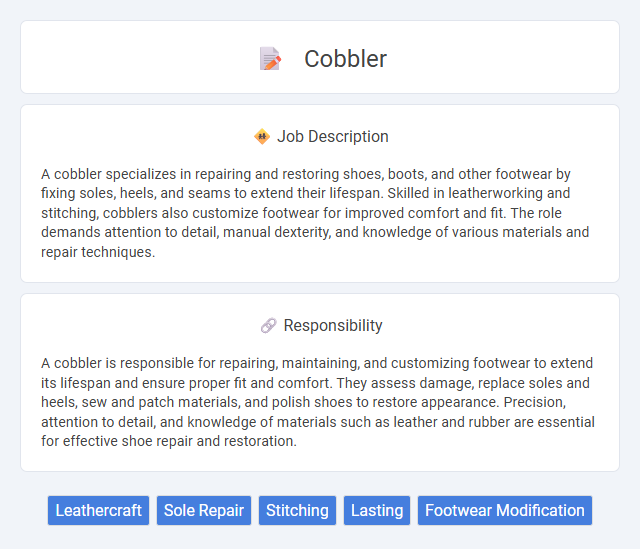
A cobbler specializes in repairing and restoring shoes, boots, and other footwear by fixing soles, heels, and seams to extend their lifespan. Skilled in leatherworking and stitching, cobblers also customize footwear for improved comfort and fit. The role demands attention to detail, manual dexterity, and knowledge of various materials and repair techniques.
Individuals with good hand-eye coordination and patience are likely to be well-suited for a cobbler job, as the work demands precision and attention to detail. Those who struggle with fine motor skills or have chronic hand pain may find the physical aspects of repairing and crafting footwear challenging. People who enjoy working independently and take pride in restoring shoes could find this occupation fulfilling.
Qualification
A skilled cobbler typically requires proficiency in leatherwork, shoe repair techniques, and hand-stitching methods. Experience with various materials like leather, rubber, and fabric, alongside knowledge of shoe construction and sole replacement, is essential. Attention to detail and the ability to use specialized tools such as sewing machines and adhesive applicators enhance job performance and craftsmanship.
Responsibility
A cobbler is responsible for repairing, maintaining, and customizing footwear to extend its lifespan and ensure proper fit and comfort. They assess damage, replace soles and heels, sew and patch materials, and polish shoes to restore appearance. Precision, attention to detail, and knowledge of materials such as leather and rubber are essential for effective shoe repair and restoration.
Benefit
Working as a cobbler likely offers steady demand due to the ongoing need for shoe repair and customization, which can result in a consistent income stream. This role may provide the opportunity to develop specialized skills in leatherwork and craftsmanship, potentially increasing job satisfaction and marketability. The job probably allows for flexible work hours and the possibility of self-employment, offering greater control over one's schedule and business growth.
Challenge
The cobbler job likely involves significant challenges related to working with various types of leather and materials, requiring precision and skill to repair or create footwear. It may demand adapting to intricate designs and maintaining durability while meeting customer expectations for comfort and style. There is probable pressure to balance speed with quality to manage multiple orders effectively.
Career Advancement
A cobbler's career advancement involves mastering advanced shoe repair techniques, specializing in custom footwear, and developing expertise in leather craftsmanship. Progression can lead to roles such as workshop supervisor, bespoke shoe designer, or owning a cobbler business that offers high-end services. Continuous skill improvement and staying updated on industry trends enhance opportunities for higher earnings and professional recognition.
Key Terms
Leathercraft
A cobbler specializing in leathercraft expertly repairs and restores leather goods such as shoes, boots, handbags, and belts using advanced stitching and conditioning techniques. Mastery in cutting, molding, and dyeing leather ensures high-quality craftsmanship that extends the lifespan of premium leather products. Proficiency in using specialized tools like awls, sewing needles, and leather adhesives is essential for precise and durable repairs.
Sole Repair
Sole repair is a critical aspect of a cobbler's job, involving the replacement or restoration of worn-out shoe soles to extend footwear lifespan and improve comfort. Expert cobblers use specialized tools and materials like leather, rubber, or synthetic soles tailored to different shoe types and customer preferences. Precision in sole repair enhances durability, foot support, and waterproofing, making it a vital service in shoe maintenance.
Stitching
A cobbler specializes in stitching durable and precise seams to repair or create footwear, ensuring structural integrity and comfort. Expert stitching techniques, such as lock stitch and chain stitch, are critical for reinforcing shoe uppers and attaching soles securely. High-quality thread materials, including nylon and polyester, enhance the longevity and toughness of the footwear repairs performed by a skilled cobbler.
Lasting
Lasting is a critical step in the cobbler job, where the upper material is shaped and attached to the sole of the shoe using a specialized lasting machine or by hand. Precision in lasting ensures proper fit, durability, and aesthetic appeal, significantly impacting the shoe's overall quality. Skilled cobblers use lasting techniques to transform materials into comfortable, well-constructed footwear.
Footwear Modification
Cobbler jobs specializing in footwear modification involve altering shoes to improve fit, comfort, and functionality, often by adjusting soles, heels, and insoles. Skilled cobblers use tools like hammers, awls, and sewing machines to reshape or resize footwear, catering to individual customer needs. Expertise in leather repair, sole replacement, and orthotic adjustments ensures enhanced durability and personalized comfort.
 kuljobs.com
kuljobs.com